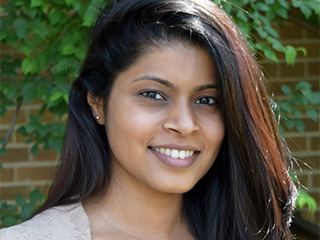Behind the scenes with Nirooya Sivapalan
Bio basics: Health and safety officer for safety services at Sunnybrook Research Institute (SRI). Responsible for developing and implementing SRI’s health and safety management system in accordance with Ontario Ministry of Labour regulations. Conducts safety awareness education and training, incident investigations and workplace inspections, and coordinates the SRI Joint Health and Safety Committee. Completed her master’s degree in immunology at McMaster University and undergraduate degree in cell and molecular biology at the University of Toronto. Joined SRI in 2013 as a research assistant in the lab of Dr. David Goertz in Physical Sciences. Born and raised in Toronto, Ont.
What interested you in working at SRI?
It’s a little bit of a personal story. Leading up to it, I had always heard great things about Sunnybrook in terms of the patient focus of the hospital. My grandfather was diagnosed with cancer. He came to the Odette Cancer Centre and went through radiation treatments weekly. Also, the translational benefits of Sunnybrook being a teaching hospital with a separate, yet integrated, research institute was really exciting to me. To see the research developed in-house used in the treatment of patients, that’s what caught my interest.
What are your responsibilities?
My responsibilities include ensuring Sunnybrook and SRI health and safety policies are followed, as well as acting as an SRI liaison for Sunnybrook safety departments. More prominent projects include training programs for SRI staff and students and the SRI hazardous materials management program, which involves procedures for the identification, handling and disposal of hazardous materials.
Why is health and safety important in a research institute?
SRI is a unique institute because we have so many different disciplines of work. We have three platforms with work happening everywhere [throughout the hospital]. Clinical researchers will either be with patients or working from their desk. Personnel in Biological Sciences and Physical Sciences are mixed, either working in our labs or with patients. It’s important for us to know what our hazards are as a research institute, and to be able to appropriately train our staff to keep them safe.
Was the transition from a research background easy?
It was a learning curve. It’s comforting to know that we’re allowing people to pursue amazing research while making sure they are safe doing it. It has been a bit of a culture change for everyone, but our staff and students have been amazing.
What’s most rewarding about your work?
That I can use my own experiences and research knowledge institute-wide to support the amazing work our researchers do is what is rewarding about my job. For those who don’t quite understand the “no walls”’ concept for SRI and only see research as restricted to S wing, I like to explain that our ability to be integrated throughout the hospital is what allows for the great strides the SRI community has made in innovation and translational medicine.
What do you enjoy to do outside of work?
I love to travel, explore the city, and enjoy time with family and friends.
About the Safety Services Team
The team provides faculty, staff and students with regulatory advice, support, education and training programs to ensure a safe working environment.
Kirishanthy Kathirkamathamby is SRI’s biosafety officer. She is responsible for managing research biosafety and biosecurity risks through a comprehensive SRI Biosafety Program. This includes implementing the requirements of the Public Health Agency of Canada licence to conduct research with biological agents. She is also responsible for the education and training programs, biological exposure investigation and providing oversight on relevant regulatory requirements for projects involving biohazardous agents.
Leading the SRI safety services team are Rod Engeland, executive director of research operations and finance, and Ariela Levy, senior manager of research operations.



